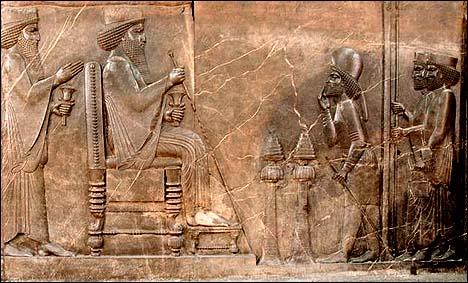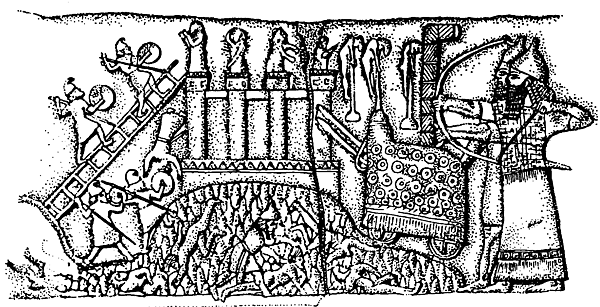 |
|
Shémek hiTankólel
Qímmu 1st
Kekkérja,
The Nchésh of the Splendid Slayers of Ssü.
|
Tales of Pecháno and victories against the Ssü, as told by Shémek hiTankólel -Kekkérja, 1st Qímmu, The Nchésh of the Splendid Slayers of Ssü.
Sunday, April 24, 2016
Law and Punishments (Part 2)
Part IV.
Law,
Police, Punishments, and the Arenas. (Continued)
 |
|
Pecháni Magistrate
issuing a verdict.
Carving on the walls of the House of Enlightened Justice,
Teshkóa.
|
Civil
courts deal with altercations between clans, temples, individuals, and other
legal entities. Assault, robbery, rape, murder, kidnapping, brawling, and other
crimes of violence fall into this category, as do suits involving breaches of
contract (including marriage agreements), divorce, clan rights, disputes over
land or water ownership or usage, embezzlement, fraud, imposture, inheritance,
personal slander, and many other kinds of illegalities.
Whenever a civil offence is
committed the complainant has three means of redress: (1) he can demand Shámtla
–“blood-money”-- from the offender; (2) he may take the case to a civil court,
which holds a hearing and imposes a settlement and/or penalties; (3) he may
resort to the ancient duelling code, “The Manifesto of Noble Deliverance”. If
the matter is such that the complainant feels that he cannot gain satisfaction
from any of the above mentioned methods, there is a fourth course open to him:
the assassin clans. However, it should be noted that this truly is a final
solution when all other courses have been exhausted or dismissed. Under Pecháni
Law the assassin clans have the right to kill, commit violence, or destroy
property – but only against private persons and clans, not against the state or
its officials in their professional capacities. In Pecháno, inevitably, the
first recourse is very often duelling. Shámtla is rarely paid out or, for that
matter, sought after, and then it is usually only scribes, merchants, or
foreigners that demand this type of settlement. Duels are very formalised
events in Pecháno, and they are almost always to the death. There are even
“facilitator clans” who are employed to arrange the type of duel, the location,
and to ensure that the conditions are adhered to. Duels are often held in the
Hirilákte Arenas which are present in the major urban centres of the nation,
and can involve several combatants. One is reminded of the events in Teshkóa
some years back (during the time of Tuhéshmu Rekhmél A.S. 1944).
 |
| Tuhéshmu Rekhmél |
There was an
altercation between the Thushchán and their rivals the Pahrnéb over logging
rights in the Guringa Forest, situated in eastern Pecháno. This
conflict festered until it ended up being so acrimonious that the clan elders
arranged to gather all of their men and meet in the Hirilákte Arena in Teshkóa
to settle the issue once and for all. Some 500 men appeared upon the duly
arranged day and proceeded to slaughter each other with such zeal that the
conflict spilled out of the arena and into the streets of Teshkóa. Numerous
casualties resulted amongst the townsfolk, who were not party to the feud, and
a good portion of the foreign quarter was set ablaze in the chaos. It was only
the direct command of Tuhéshmu Rekhmél himself that ultimately stopped the
fighting which raged for 7 hours. Even to this day these two clans still
harbour animosity towards each other, and it takes very little to fan the
flames.
Friday, April 22, 2016
Social Institutions
Well its been some time since the last post. I have started a new game, and this initially took up much of my free time. However, I've gotten the story arc figured out and I can now go back the posting.
Part III
Social
Institutions
There are perhaps 50 clans in Pecháno.
No one has ever done a census. The Beneshchán and Rekhmél lineages are the biggest
and most powerful. Some are remote mountain clans, almost equivalent to “tribes”.
A few are occupation-based: bakers, wine-makers, carters, smiths, butchers,
arms and armour-makers, and the like. A couple are religious in nature:
secretive and devoted to their deities. Pecháni don’t introduce their clan
names with “hi”, as the Tsolyáni do. They put the personal name first, followed
by the clan name. The Pecháni, like the Salarvyáni, stress hereditary family
position, and noble titles, which are accompanied by both political power and
wealth. An individual’s position depends upon his family and its standing in
the ranked tiers of the society. Within Pecháni society the warrior lineages
are considered the most prestigious. Slavery is present in Pecháno however,
like the Salarvyáni, slaves are owned by individuals and not by the clan as a
whole. Far more common are indentured servants and serfs who are still
accountable under the law!
 |
Pecháni Warriors sacking a Salarvyáni fortress.
Column Carving: Hall of Skulls, Mechanéno.
|
Part IV
Law,
Police, Punishments, and the Arenas
The legal system of Pecháno is
founded upon the principles laid down by the Priest Kings of Éngsvan hla Gánga.
Theoretically, this should provide for a monolithic, nationwide hierarchy,
which stretches, from the village headman all the way up to the highest courts
in the land. There should be no local laws or ordinances: what is legal in Mechanéno
should be legal in Teshkóa or Ogréjja. Reality is somewhat different, however. Like
Salarvyá, Pecháno is a feudal monarchy, the Beneshchán, and Rekhmél are the
absolute masters of their lands, and minor deviations of the state laws are not
uncommon. The Pecháni legal system falls somewhere in between the centralised Tsolyáni
one, and the decentralised Salarvyáni system. The authority of Mechanéno does manage
to keep things consistent for the most part.
There are two types of courts in Pecháno:
Imperial, or Royal, and Civil. There are no ecclesiastical courts in Pecháno.
Any disputes amongst the temples, or with the temples are settled in Civil Court.
A Royal Court tries cases in which the state itself is the aggrieved
party: treason, spying, speculation of state monies or property, dishonesty in
a royal post, cowardice or disobedience by soldiers and a variety of other
similar offences fall under its purview.
Part IV Continued next post...
Subscribe to:
Comments (Atom)